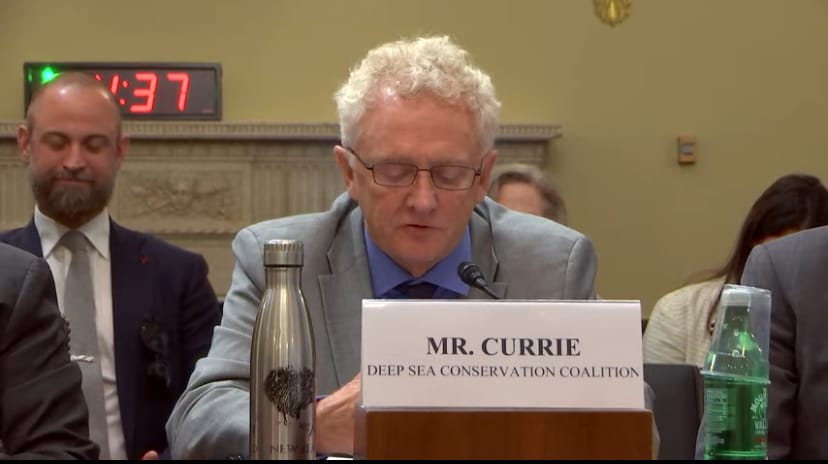Conservationist tells US lawmakers that Deep Sea Mining will harm, not help the country

A prominent international coalition against deep sea mining has delivered a searing warning to US lawmakers that the move to unilaterally issue licences will be disadvantageous economically, scientifically and environmentally to the country.
The Trump administration said deep sea mining will net US$300 billion for the US economy in the first decade and create 100, 000 new jobs.
But at a hearing in the US capital Tuesday, Duncan Currie, legal advisor to the Deep Sea Conservation Coalition, argued that deep sea mining is unlikely to net the gains being touted.
Duncan Currie of the Deep Sea Conservation Coalition addressing a US subcommittee oversight hearing on Deep Sea Mining on Tuesday.U
Trump's executive order is seen as a move to desperately claw back market share from China, who overwhelmingly dominates the global mining and metals market and supplies most of the raw materials to American manufacturers.
But Duncan Currie suggested that that might be wishful thinking, as China also controls the processing of these minerals and deep sea mining will not overcome that issue for the United States.
Duncan Currie of the Deep Sea Conservation Coalition addressing a US subcommittee oversight hearing on Deep Sea Mining on Tuesday.
China controls 70 percent of rare earth mineral production through its global supply chain dominance and 90 percent of processing output.
But The Metals Company CEO, Gerard Barron, dismissed the concerns as an activist tactic in the following exchange with congresswoman Maxine Dexter, of Oregon.
Gerard Barron, The Metals Company CEO in an exchange with Congresswoman Maxine Dexter at Tuesday's Deep Sea Mining hearing.
Outside of the economics, Mr Currie argued that the removal of the nodules themselves would be a problem, not just because of the possible impact of retrieval methods, but because science has not yet established how important the nodules may be to their ecosystems.
He noted that the International Seabed Authority which the US has bypassed, also deals with maritime boundaries, extended outer continental shelf claims, and freedom of navigation for vessels and that the US was creating much bigger issues in these areas by going it alone.
Deep Sea Conservation Coalition is an international lobby that works with NGOs, governments, and scientists to protect vulnerable marine ecosystems and it is staunchly against deep sea mining. The group has already amassed a coalition of 32 countries and large brands to stand against the practice.
- All clips are courtesy of: House Committee on Natural Resources GOP: YouTube and are therefore public domain.
- View our previous story on this hearing: US Representatives question financial viability of Deep Sea Mining.
- For editorial comments or to submit anything related to deep sea mining, get in touch at [email protected]

